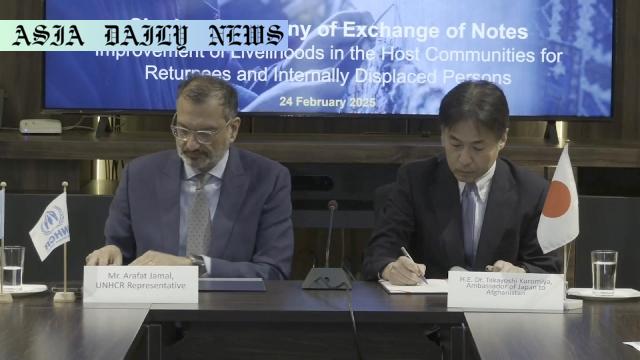Afghanistan: Japan pledges 6M USD to aid displaced Afghans.

Japan’s Commitment to Addressing Afghanistan’s Displacement Crisis
In a significant move aimed at addressing the ongoing humanitarian and displacement crisis in Afghanistan, Japan has pledged $6 million in aid. Partnering with the United Nations’ Refugee Agency (UNHCR), this fund will support sustainable livelihoods for displaced Afghans, including individuals who have returned to the country amid ongoing challenges. The decision underscores Japan’s dedication to international humanitarian efforts, especially in regions most affected by conflict and instability.
What the Project Entails
As part of the initiative, the allocated funds will be used to implement key projects aimed at rehabilitating Afghanistan’s struggling economy and fostering community development. Projects include the construction of cold storage facilities for fresh vegetable farming, which will provide a much-needed boost for local agriculture sectors. Additionally, new production centers for traditional handcrafts—such as carpets and silk textiles—will offer an avenue for displaced Afghan individuals to reclaim financial independence through meaningful work opportunities.
Challenges Facing Afghanistan
Since the Taliban’s return to power in 2021, Afghanistan’s economy has faced sanctions from Western nations, causing prolonged instability and economic hardship. The humanitarian crisis has deepened, and resource scarcity has affected millions of citizens. Compounding the issue, the partial freezing of U.S. foreign aid programs has left many dependent on international relief to meet basic needs.
Japan’s Vision for Afghan Recovery
Kuromiya Takayoshi, Japan’s ambassador to Afghanistan, emphasized the critical importance of empowering ordinary Afghans. The focus, he noted, should remain on enabling citizens to create sustainable livelihoods despite the challenges they face. Through this collaboration with the UNHCR, Japan aims to strengthen economic resilience and provide displaced Afghan families with resources to rebuild their futures and stabilize local communities amid ongoing uncertainties.
UNHCR’s Role in the Initiative
The UNHCR has long been at the forefront of efforts to assist displaced populations worldwide, and its role in this partnership will be pivotal. By deploying expertise in managing refugee-returnee integration and supporting sustainable development programs, the agency will play a central part in ensuring completed phases of this initiative achieve tangible impact. The organization has reiterated its commitment to aiding Afghanistan as it navigates through this critical juncture.
The Broader Implications
This $6 million fund represents more than a financial donation; it signals hope and a pathway towards self-reliance for displaced Afghans. The emphasis on agricultural advancements and cultural craftsmanship will not only create jobs but also revive industries deeply embedded in Afghan heritage. Long term, these initiatives could contribute to stabilizing the Afghan economy and lessening dependence on external aid, creating a model that other nations could potentially follow.
The Path Ahead
While Japan’s commitment marks a significant step forward, ensuring the program’s success will require consistent monitoring, transparency, and cooperative partnerships with both local agencies and international bodies. The ongoing crisis necessitates further collaborative efforts from global entities to build upon this foundation. Moreover, it remains imperative for the international community to address the root causes of displacement in Afghanistan to pave the way for lasting stability.
Conclusion
Japan’s $6 million agreement with the UNHCR reflects the nation’s resolve to support vulnerable populations and champion sustainable development. As Afghanistan continues to grapple with deep-seated economic and humanitarian challenges, programs like these offer a glimmer of hope for communities seeking to reclaim their stability. By focusing on fostering long-term livelihoods and enhancing self-reliance, Japan’s initiative provides not just relief but an enduring framework for rebuild and prosperity.
Commentary
Japan’s Bold Step Towards Afghan Relief
Japan’s decision to channel $6 million towards aiding displaced Afghans is both noble and timely. With Afghanistan battling economic collapse and humanitarian crises since the Taliban took power, this contribution provides a lifeline for countless families. What stands out here is Japan’s focus on creating sustainable livelihoods. Rather than solely providing emergency aid, Japan is aiming for long-term economic resilience—a lesson many global donors should take into account.
The Importance of Sustainable Solutions
The emphasis on agricultural infrastructure and traditional handcraft industries is particularly commendable. These sectors are not only critical to Afghanistan’s heritage but also provide immense potential for economic recovery. By fostering self-reliance, these initiatives empower Afghans to participate actively in rebuilding their lives and communities. It’s encouraging to see projects that go beyond immediate aid and instead focus on lasting solutions.
Global Responsibility in Humanitarian Crises
Japan’s partnership with the UNHCR also highlights the importance of global collaborations in tackling challenges of displacement and poverty. Afghanistan’s plight is a reminder to the international community that sustained relief must be complemented by broader systemic changes, such as easing sanctions, fostering dialogue, and addressing the underlying causes of economic and political instability. Japan’s move sets an example for others to step up with similarly impactful contributions.
Looking Ahead
While Japan’s efforts are commendable, the scope of Afghanistan’s challenges remains vast. It will require persistent support from countries worldwide to build upon this foundation. Nevertheless, Japan has provided a vital blueprint: one rooted in compassion, sustainability, and forward-thinking. Hopefully, this initiative will inspire other nations to enact initiatives that prioritize both immediate relief and enduring recovery.


